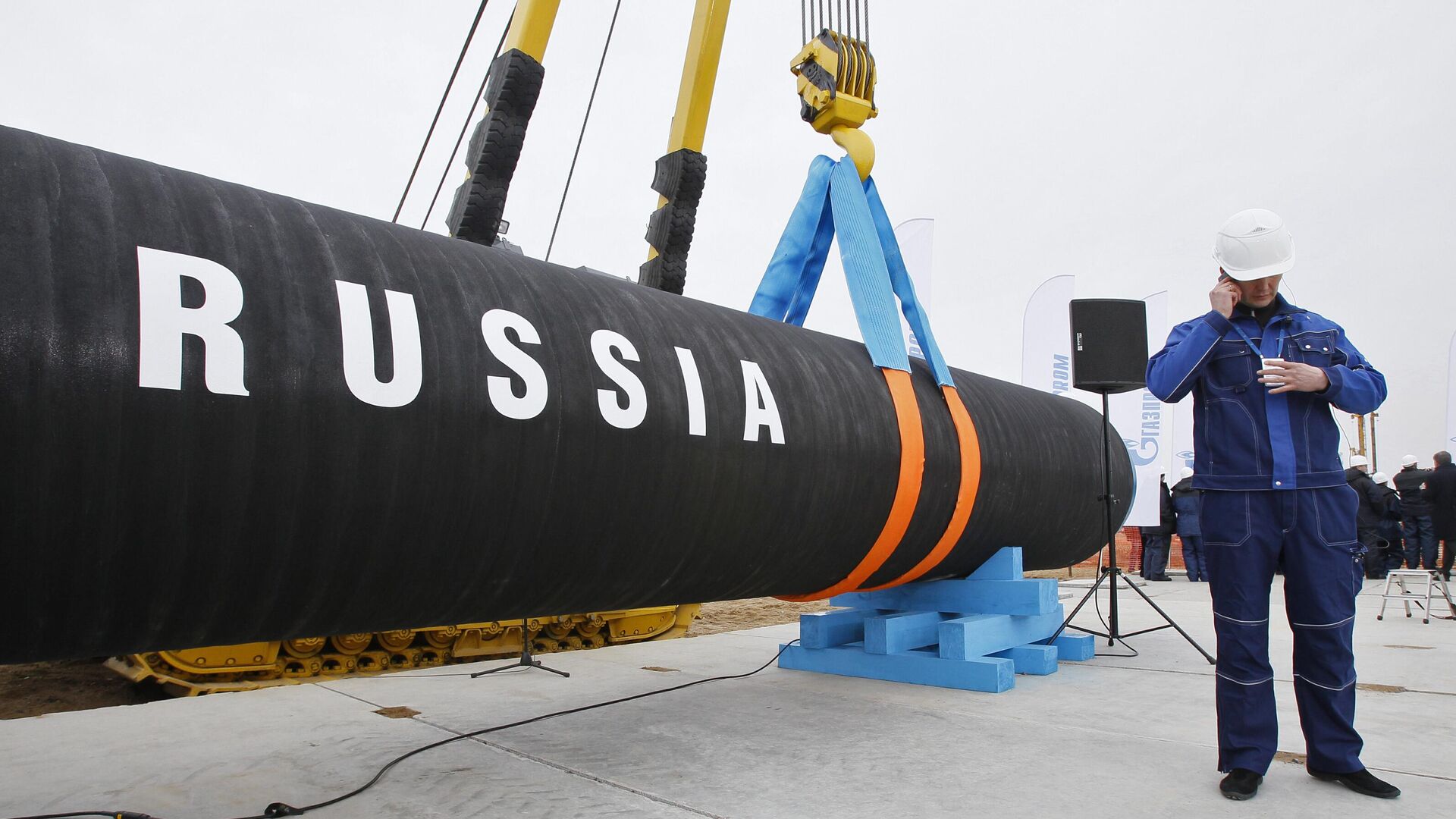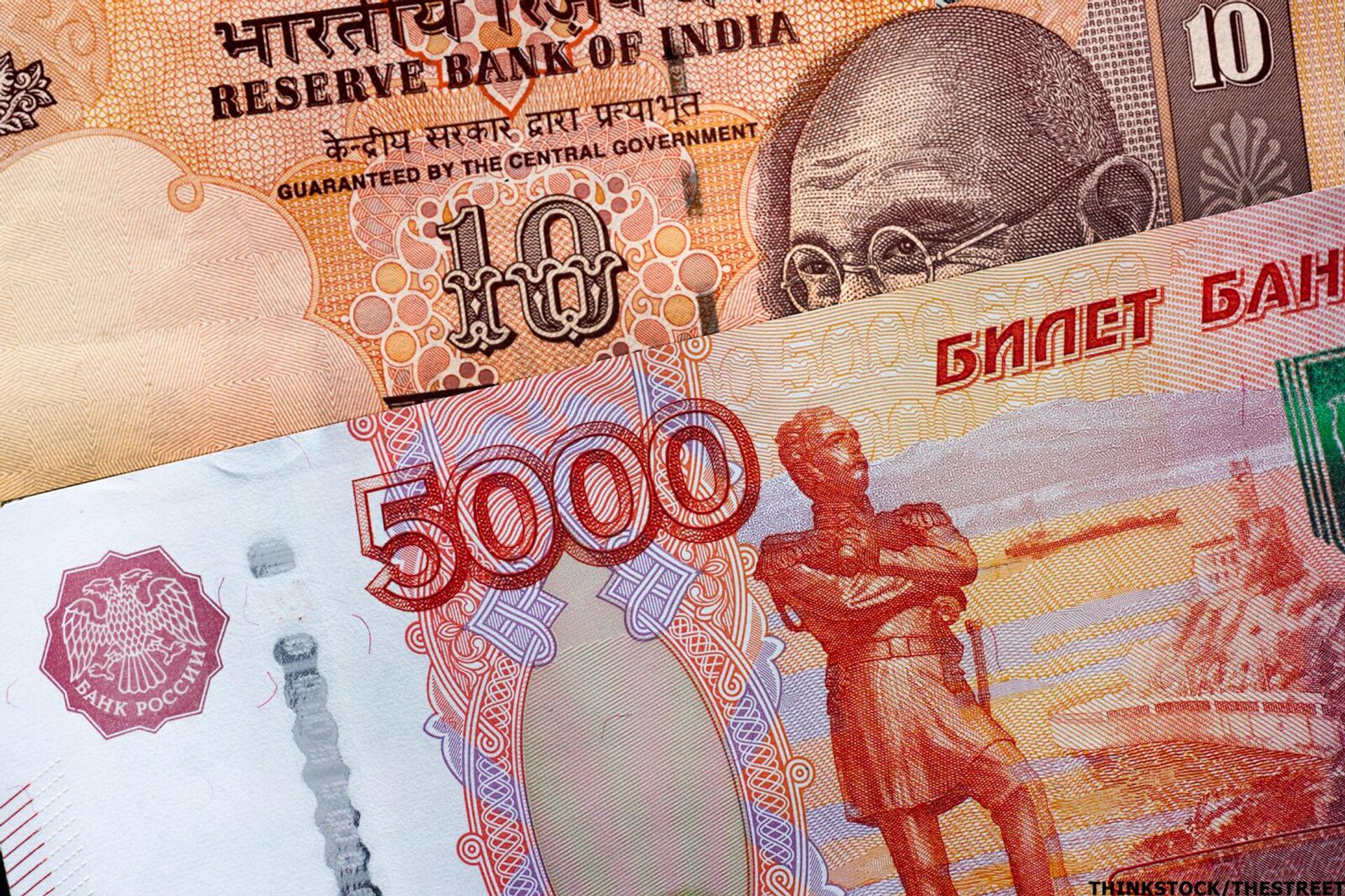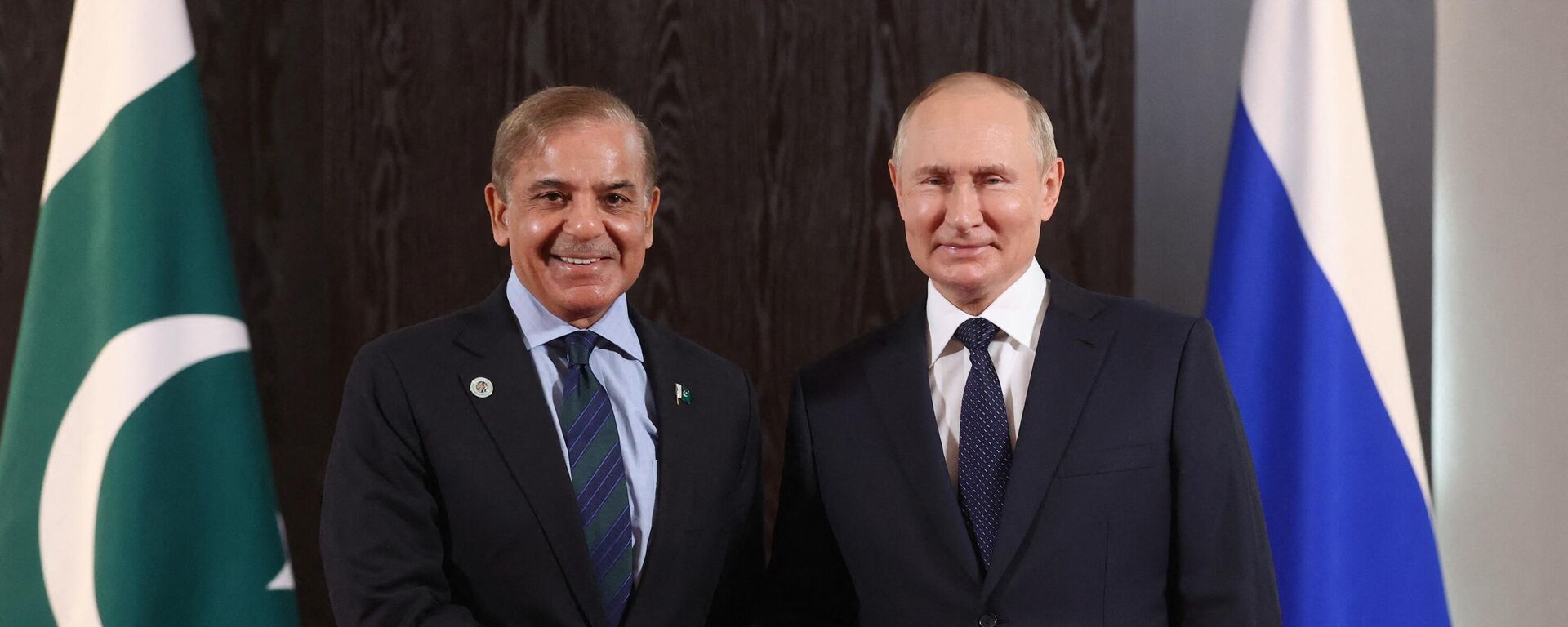https://sputniknews.in/20240818/how-russia--pakistan-could-pave-new-pathways-in-energy-trade-8027527.html
How Russia & Pakistan Could Pave New Pathways in Energy Trade
How Russia & Pakistan Could Pave New Pathways in Energy Trade
Sputnik India
Russia has recently communicated to Pakistan that its LNG export terminals will get ready in 2026 for gas trade with Pakistan. Why does this announcement hold significant importance to both the countries?
2024-08-18T19:24+0530
2024-08-18T19:24+0530
2024-08-18T19:24+0530
shehbaz sharif
vladimir putin
pakistan
russia
shanghai cooperation organisation (sco)
western sanctions
gas exports
liquefied natural gas (lng)
oil and gas reserves
gas pipeline
https://cdn1.img.sputniknews.in/img/07e8/06/06/7550932_0:0:3190:1794_1920x0_80_0_0_e623a4f11ac80521eb80ee6d27f51128.jpg
Both nations are exploring the potential for future liquefied natural gas (LNG) transactions, especially with Pakistan's long-term agreements with Qatar nearing a critical price re-opening phase in 2026.The price review negotiations between Qatar as an LNG producing country and Pakistan as LNG buying country will initiate in March 2026 according to a report, quoting a senior official from Pakistan's Ministry of Energy. In case, the price is not agreed within six months, any party may terminate or walk away from the contract.In that case, the supply of LNG from Russia holds significant importance to Pakistan.Russia’s LNG ExpansionThe analyst stated that now Russia has tapped into new markets across Asia, including Pakistan, which is seeking to diversify its energy import sources. “The operational LNG terminals will provide Russia with a more flexible and competitive approach to global energy markets, allowing it to respond to market demands and bypass traditional pipeline routes that are subject to geopolitical risks,” he added.The offer made by Russia for a liquefied natural gas (LNG) pipeline took place during a meeting between Pakistan’s Prime Minister, Shehbaz Sharif, and Russian President, Vladimir Putin, on the sidelines of the Shanghai Cooperation Organisation (SCO) summit earlier in July, 2024.Pakistan’s Energy LandscapeMeanwhile, Pakistan's energy landscape is at a critical juncture. The country's economy is heavily dependent on imported energy, with natural gas playing a significant role in its energy mix. However, Pakistan faces chronic energy shortages, which have hindered economic growth and development.A former diplomat in Pakistan’s Foreign Service and political observer, Khalid Shikari, told Sputnik India that Pakistan’s existing LNG agreements with Qatar have provided some stability, but these agreements are nearing a critical price re-opening phase in 2026, which may lead to price hikes.Complexities of Payment Mechanisms Amidst US SanctionsWhile the prospect of Russia-Pakistan LNG trade is promising, it is fraught with complexities, particularly in the realm of payment mechanisms. The US has imposed extensive sanctions on Russia's oil and gas sector, complicating transactions with Russian energy companies.The reliance on the US dollar for international trade means that any financial dealings with Russian entities could expose Pakistan to secondary sanctions, which could impact its broader economic and financial interests.According to the former diplomat, one potential solution is to conduct trade in local currencies.Another option is to explore the use of alternative financial mechanisms, such as barter trade or the establishment of a special purpose vehicle (SPV) that can facilitate transactions without involving the US financial system.Potential Avenues for Russia and PakistanTalking about how to successfully bypass the US sanctions, Dr. Rashid told Sputnik India that Russia and Pakistan may need to adopt a multi-faceted approach that includes diplomatic, financial, and technological strategies.He feels that both the countries can work out a barter system where goods and services are exchanged without involving cash transactions, to circumvent sanctions.Another emerging solution is the use of blockchain technology and digital currencies for cross-border transactions. Russia has been exploring the use of the digital ruble, while Pakistan has shown interest in digital financial services. According to the analyst, blockchain could provide a secure and transparent way to conduct transactions, reducing the reliance on traditional banking systems that are susceptible to sanctions. However, the adoption of such technology would require significant regulatory changes and infrastructure development.“Also through regional cooperation such as the Shanghai Cooperation Organisation (SCO) or the Belt and Road Initiative (BRI) Pakistan may learn how other countries conduct trade with Russia and that could provide a broader platform for energy trade, reducing the reliance on Western-dominated financial systems,” Dr. Rashid stated.Far Reaching ImplicationsFor Russia, deepening energy ties with Pakistan could bolster its influence in South Asia, countering the US and its allies' dominance in the region.Hence, Russia and Pakistan will need to adopt innovative and multifaceted strategies, including the use of local currencies, barter trade, SPVs, and emerging technologies like blockchain, to conduct energy trading. The outcome of the potential LNG trade will not only impact the energy security of both nations, but also reshape the geopolitical dynamics of the region.
https://sputniknews.in/20240525/navigating-global-south-where-does-pakistan-russia-relationship-stand-7449819.html
pakistan
russia
Sputnik India
feedback.hindi@sputniknews.com
+74956456601
MIA „Rossiya Segodnya“
2024
Aneela Rashid
https://cdn1.img.sputniknews.in/img/07e6/0c/0d/74548_0:0:485:484_100x100_80_0_0_821526e967ae85d041e2d30ee34fa1de.jpg
Aneela Rashid
https://cdn1.img.sputniknews.in/img/07e6/0c/0d/74548_0:0:485:484_100x100_80_0_0_821526e967ae85d041e2d30ee34fa1de.jpg
News
en_IN
Sputnik India
feedback.hindi@sputniknews.com
+74956456601
MIA „Rossiya Segodnya“
Sputnik India
feedback.hindi@sputniknews.com
+74956456601
MIA „Rossiya Segodnya“
Aneela Rashid
https://cdn1.img.sputniknews.in/img/07e6/0c/0d/74548_0:0:485:484_100x100_80_0_0_821526e967ae85d041e2d30ee34fa1de.jpg
russia, pakistan, gas news, trade, lng gas, energy, latest news on energy, liquefied natural gas
russia, pakistan, gas news, trade, lng gas, energy, latest news on energy, liquefied natural gas
How Russia & Pakistan Could Pave New Pathways in Energy Trade
Russia has recently communicated to Pakistan that its LNG export terminals will get ready in 2026 for gas trade with Pakistan. Why does this announcement hold significant importance to both the countries?
Both nations are exploring the potential for future
liquefied natural gas (LNG) transactions, especially with Pakistan's long-term agreements with
Qatar nearing a critical price re-opening phase in 2026.
The price review negotiations between Qatar as an LNG producing country and
Pakistan as LNG buying country will initiate in March 2026 according to a report, quoting a senior official from
Pakistan's Ministry of Energy. In case, the price is not agreed within six months, any party may terminate or walk away from the contract.
In that case, the supply of LNG from Russia holds significant importance to Pakistan.
“Historically, Russia has relied on pipeline gas exports to Europe, a relationship that has been strained due to geopolitical tensions and the imposition of Western sanctions following the ongoing conflict in Ukraine,” geopolitical analyst and former Unit Head of Engro Corporation, Dr. Shahid Rashid told Sputnik India.
The analyst stated that now
Russia has tapped into new markets across Asia, including
Pakistan, which is seeking to diversify its
energy import sources. “The operational LNG terminals will provide Russia with a more flexible and competitive approach to global energy markets, allowing it to respond to market demands and bypass traditional pipeline routes that are subject to geopolitical risks,” he added.
The offer made by Russia for a liquefied natural gas (LNG) pipeline took place during a meeting between Pakistan’s Prime Minister,
Shehbaz Sharif, and Russian President,
Vladimir Putin, on the sidelines of the
Shanghai Cooperation Organisation (SCO) summit earlier in July, 2024.
According to Dr. Rashid, “For Russia, engaging in LNG trade with Pakistan serves several strategic purposes. Firstly, it provides an alternative revenue stream that reduces its dependence on European markets. Secondly, it strengthens Russia's influence in South Asia, a region where energy security is a major concern. Lastly, it aligns with Russia's broader goal of fostering multipolarity in global energy markets, reducing the dominance of Western powers.”
Pakistan’s Energy Landscape
Meanwhile, Pakistan's energy landscape is at a critical juncture. The country's economy is heavily dependent on
imported energy, with natural gas playing a significant role in its energy mix. However, Pakistan faces chronic energy shortages, which have hindered economic growth and development.
A former diplomat in Pakistan’s Foreign Service and political observer, Khalid Shikari, told Sputnik India that Pakistan’s existing LNG agreements with Qatar have provided some stability, but these agreements are nearing a critical price re-opening phase in 2026, which may lead to price hikes.
“The prospect of LNG imports from Russia offers Pakistan an opportunity to diversify its energy sources, potentially securing more favorable terms and reducing its dependence on any single supplier. The timing of Russia's LNG terminals becoming operational aligns well with Pakistan's need to renegotiate its LNG contracts, presenting an opportunity for Islamabad to leverage multiple suppliers in its negotiations,” Shikari stated.
Complexities of Payment Mechanisms Amidst US Sanctions
While the prospect of Russia-Pakistan LNG trade is promising, it is fraught with complexities, particularly in the realm of payment mechanisms. The US has imposed extensive sanctions on Russia's oil and gas sector, complicating transactions with Russian energy companies.
“These sanctions include restrictions on access to the US dollar, which is the dominant currency in global trade, including energy transactions. For Pakistan, conducting transactions with Russia under these circumstances poses significant challenges,” Shikari said.
The reliance on the US dollar for international trade means that any financial dealings with Russian entities could expose Pakistan to secondary sanctions, which could impact its broader economic and financial interests.
According to the former diplomat, one potential solution is to conduct trade in local currencies.
“In June Russia announced that nearly 40% of the country's trade turnover is now in rubles. The country has been actively promoting the use of the ruble in its trade with other countries, particularly with nations that are also under Western sanctions or have strained relations with the West. For Pakistan, using the rupee or the ruble for LNG transactions with Russia could provide a way to bypass US sanctions,” Shikari stated.
Another option is to explore the use of alternative financial mechanisms, such as barter trade or the establishment of a special purpose vehicle (SPV) that can facilitate transactions without involving the US financial system.
Potential Avenues for Russia and Pakistan
Talking about how to successfully bypass the US sanctions, Dr. Rashid told Sputnik India that Russia and Pakistan may need to adopt a multi-faceted approach that includes diplomatic, financial, and technological strategies.
He feels that both the countries can work out a barter system where goods and services are exchanged without involving cash transactions, to circumvent sanctions.
“For instance, Pakistan could export agricultural products, textiles, or other goods to Russia in exchange for LNG. This method, while potentially cumbersome, could reduce the need for financial transactions that could trigger sanctions,” the analyst stated.
Another emerging solution is the use of blockchain technology and digital currencies for cross-border transactions. Russia has been exploring the use of the digital ruble, while Pakistan has shown interest in digital financial services. According to the analyst, blockchain could provide a secure and transparent way to conduct transactions, reducing the reliance on traditional banking systems that are susceptible to sanctions. However, the adoption of such technology would require significant regulatory changes and infrastructure development.
“Also through regional cooperation such as the Shanghai Cooperation Organisation (SCO) or the Belt and Road Initiative (BRI) Pakistan may learn how other countries conduct trade with Russia and that could provide a broader platform for energy trade, reducing the reliance on Western-dominated financial systems,” Dr. Rashid stated.
Far Reaching Implications
For Russia, deepening energy ties with Pakistan could bolster its influence in South Asia, countering the US and its allies' dominance in the region.
“It could also provide Russia with leverage in its dealings with India, Pakistan's rival and a significant consumer of Russian energy. For Pakistan, diversifying its energy sources through LNG imports from Russia could enhance its energy security and strengthen its position in regional geopolitics,” Dr. Rashid noted.
Hence, Russia and Pakistan will need to adopt innovative and multifaceted strategies, including the use of local currencies, barter trade, SPVs, and emerging technologies like blockchain, to conduct energy trading. The outcome of the potential LNG trade will not only impact the energy security of both nations, but also reshape the geopolitical dynamics of the region.




